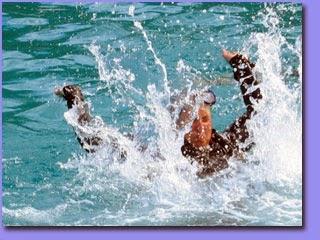
Although under water anxiety attacks are common events in scuba diving, most beginner scuba divers may not know how common they are until they start taking their training classes. So, instructors who want to keep their classes safe from harm usually advise their students of the frequency and how to handle them if they occur while they are under water.
Divers who have had these experiences may describe the attacks as a sudden panicky feeling when they realize that they are under the water and a great distance away from dry land. In many cases, these fears are often unprovoked since there are no real threats surrounding them. Therefore, it is important for each diver to know how to handle the anxiety attacks if or when it happens to them. According to Dr. Richard D. Telford, author of Take Care of Yourself, one of the most important skills an individual may have in life is controlling the anxiety instead of letting it control the individual. By taking control of the anxiety, it will prevent the stressful situation from progressing into a full-blown panic attack. Listed below are some invaluable tips that people can use to remain safe.
Confront the Anxiety Before The Dive
Beginner divers should start by controlling their fears before leaving home. This can be accomplished by asking numerous questions that relate to the individual’s capabilities and desires. For instance, is the person mentally and physically prepared to make the dive? Or, is this really the individual’s idea of having fun? If the person finds that they are having problems with responding appropriately to these practical questions, they should not make the dive. Specifically, in cases where the person may feel that the dive is beyond their physical capabilities.
Express Feelings to Divemaster
If the beginner diver decides to take the dive but they are still feeling a little anxious, the individual should let the divemaster know what they are feeling. Since the divemaster’s role is to keep the divers safe, they can pair these divers with a buddy so that they can assist. One of the buddy’s primary functions is to help with carefully walking the person through the dive. For instance, the buddy may start their dive off by checking the reliability and safety of the scuba diving equipment. While this strategy may appear to be insignificant, the purpose is to help allay the fears of the individual because these are normally some of the actual thoughts that race through their mind.
Preventing Anxiety Underwater
The real test, however, begins when the individual is under the water since this is where the actual panic attack normally happens. Therefore, one of the best ways the buddy can help to keep the anxiety at bay is to focus the individual’s mind on enjoying the diving experiences. One of which is looking at all of the beautiful scenery that surrounds them when they are swimming around. Also, to make the experience completely trouble-free, the buddy diver should not take the beginner in caves or other places that can provoke normal fears to occur. Instead, buddy divers may want to leave the cave experience until the diver becomes more comfortable under the water. In fact, future dives will always allow time for branching out into the deep.
While underwater anxiety attacks are common among many beginner scuba divers, there are ways to minimize the impact and keep the beginner safe from harm. One of the most common methods used is pairing the diver up with a buddy so that they can walk the person through these experiences.
Kathy Dowsett
kirkscubagear.comArticle Source:
EzineArticles.com/8020916